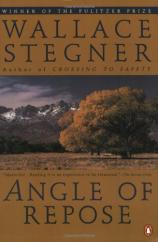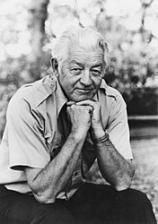Reading Group Guide
Discussion Questions
Angle of Repose

1. What do you think of Stegner's narrative technique, i.e., his use of a contemporary historian to tell Susan Ward's story? Is Lyman Ward a reliable narrator? How would this novel be different if Lyman's own story were excluded?
2. Stegner's narrator is confined to a wheelchair and partially paralyzed. He cannot move his head to either side, and thus can only look straight ahead. How does Stegner use these limitations to shape Lyman's role as a narrator and biographer? What is Stegner saying about the past and future?
3. How much of Susan Ward's destiny was determined by the era in which she lived and the limitations that era placed on a woman's freedom? Do you think of her as a woman ahead of her time?
4. Throughout the novel, Susan is torn between her old life on the east coast and her new one on the west. To each of her western homes she strives to bring a sense of gentility and comfort, even in the most rudimentary of circumstances. Her cabin in Leadville, for instance, becomes a magnet for the town's cultural elite despite the cramped quarters. Are the efforts futile or worthwhile? Do you applaud her attempts at civilizing the West or is she merely unable to accept another way of life for what it is? Is there a fundamental difference between America's two coasts today?
5. Stegner eliminates any concrete evidence of Susan's infidelity with Frank Sargent, leaving Lyman the task of piecing together the events that led up to Agnes's death. Why are these details left deliberately obscure? Does this heighten or mitigate the effects of Agnes's death on the story? Is Lyman being fair to Susan in his depiction of these events?
6. Susan often wonders if she made the right decision in marrying Oliver. Would someone like Thomas Hudson have brought her more happiness? What do you imagine Susan's life would have been like if she had stayed in the East? How did her years in the West shape her character?
7. Why does the novel end with Susan's return to Idaho? Why is it significant that the details of her life in the house in Grass Valley are given to us through the present only?
8. Do you think Lyman identifies more with his grandmother or his grandfather? How do the various aspects of his present situation—i.e., age, physical disability, marriage, career—compare and contrast to those of his grandparents?
9. The geologic term 'angle of repose', defines the angle of the slope at which debris will cease rolling downhill and settle in one place, as in a landslide. Why do you think Stegner chose this term for the title of his novel? By the end of the novel, has Lyman reached his own angle of repose? How does he change over the course of the summer in which this novel takes place?
10. Stegner's novels are known for their strong sense of place. What role does the terrain in the West play in Angle of Repose? Would you consider the land to be a 'character' in the novel? Can you describe this character in human terms?
11. The story of America's western expansion has been told in myriad ways, but often with the same details: danger and hardships, brave but crude pioneers, and get-rich-quick schemes peddled by untrustworthy scam artists. How do Susan and Oliver's experiences compare and contrast with these myths of the American West? How is each a hero in his or her own right? How are they different from the stereotypical western hero?
12. Angle of Repose was written in 1971, during a period of great upheaval in America's social and political culture. How does Stegner's novel reflect the issues that were prevalent at the time of his writing? What are the parallels, if any, between Susan Ward's story and that of Shelly Hawkes? How does each woman represent her own era? Is either story as relevant today?
Angle of Repose
- Publication Date: May 1, 1992
- Paperback: 569 pages
- Publisher: Penguin (Non-Classics)
- ISBN-10: 014016930X
- ISBN-13: 9780140169300








